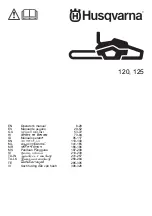
24
| English
F 016 L81 142 | (7.12.16)
Bosch Power Tools
Working with the Chain Saw
Before Cutting
Before starting operation and periodically during cutting, car-
ry out the following checks:
– Is the chain saw in a fail-safe condition?
– Is the oil reservoir filled? Check oil level gauge prior to
starting and regularly during operation. Refill oil when oil
level has reached the bottom edge of the viewing glass.
The oil tank filling will last approx. 15 minutes, depending
on sawing intensity and stops.
– Is the saw chain properly tensioned and sharp? Check
chain tension every 10 minutes during operation. Upon in-
itial operation, new chains can lengthen considerably. The
condition of the chain influences the cutting performance.
Only a sharp chain protects from overload.
– Is the kickback brake deactivated and its function en-
sured?
– Are you wearing the required protective equipment? Wear
safety glasses and hearing protection. Further protective
equipment for head, hands, legs and feet is recommend-
ed. Suitable protective clothing reduces the danger of inju-
ry from thrown about cutting material and accidental
touching of the saw chain.
Kickback (see figure D)
Kickback is the sudden backward/upward motion of the chain
saw, occuring when the chain (at the tip of the chain bar)
comes in contact with a log or wood, or when the chain be-
comes jammed.
When kickback occurs, the chainsaw reacts unpredictable
and can cause heavy injuries to the operator or bystanders.
Particular attention must be given when sawing sidewards,
slanted or during length cuts, as the gripping teeth
13
usually
can not be applied.
To avoid kickback:
– Saw with the chain bar at a flat angle.
– Never work with a loose, widely stretched or heavily worn
out saw chain.
– Sharpen the saw chain as specified.
– Never saw above shoulder height.
– Never work with the tip of the chain.
– Always hold a chain saw firmly with both hands.
– Always use a Bosch low-kickback saw chain.
– Apply the metal gripping teeth
13
for leverage.
– Ensure correct chain tension.
General Behaviour (see figures D – G)
Always hold the chain saw firmly with both hands. Front han-
dle with the left hand and rear handle with the right hand. Ful-
ly grip both handles with thumb and fingers at all times during
operation. Never operate chain saw using only one hand. En-
sure power cord is located to the rear, and keep it out of the
range of the saw chain and cutting material; position yourself
in such a manner that the mains cable can not get caught in
branches and twigs.
Use the chain saw only with secure footing. Hold the chain
saw at the right-hand side of your body.
The chain must be running at full speed before it makes con-
tact with the wood. Use the gripping teeth
13
to support the
chain saw on the wood. Use the gripping teeth as a leverage
point while cutting.
Reset the gripping teeth at a lower point when sawing thicker
logs or tree trunks. For this, pull the chain saw slightly back-
wards until the gripping teeth release, and reposition at lower
level to continue sawing. Do not remove the chain saw com-
pletely out of the cut.
Do not force the saw chain while cutting, let the chain do the
work, using the gripping teeth
13
to apply minimal leverage
pressure.
Never operate the chain saw with arms fully extended. Do not
attempt to saw areas which are difficult to reach, or on a lad-
der. Never saw above shoulder height.
Sawing is optimized when the chain speed remains steady
during cutting.
Beware when reaching the end of the cut. The weight of the
chain saw changes unexpectedly as it cuts free from the
wood. Danger of injury to the legs and feet.
Always remove the chain saw from a wood cut while the saw
chain is running.
Cutting Logs (see figures E and H)
When cutting logs, observe the following safety instructions:
Support logs so that the face sides at the cut do not close in
against each other, which would result in the chain being
jammed.
Position and set short logs safely before sawing.
Saw only wood or wooden objects. When sawing, always take
care to avoid hitting stones, nails, etc., as these could be
thrown up, could cause damage to the chain, or could result in
serious injury to the operator or bystanders.
Keep a running chain saw clear of wire fencing or the ground.
Use of the saw to thin out branches or bushes is not approved.
Length cuts must be carried out with particular care, as lever-
age with the gripping teeth
13
is not possible. Saw at a flat an-
gle to avoid kickback.
When working on a slope, operate above or to the side of the
trunk or laying tree.
Be careful not to trip over tree stumps, branches, roots, etc.
Cutting Wood under Tension (see figure H)
Be extremely careful when sawing wood, branches or
trees under tension. Leave saw jobs like these to
trained professionals.
There is a high risk of accidents.
When sawing logs supported on both ends, start the cut from
above (
Y
) about one third of the diameter into the log and
then finish the cut at the same spot from below (
Z
), in order to
avoid splitting of the log or jamming of the saw. Avoid contact
of the saw chain with the ground.
OBJ_BUCH-1238-002.book Page 24 Wednesday, December 7, 2016 2:54 PM
















































